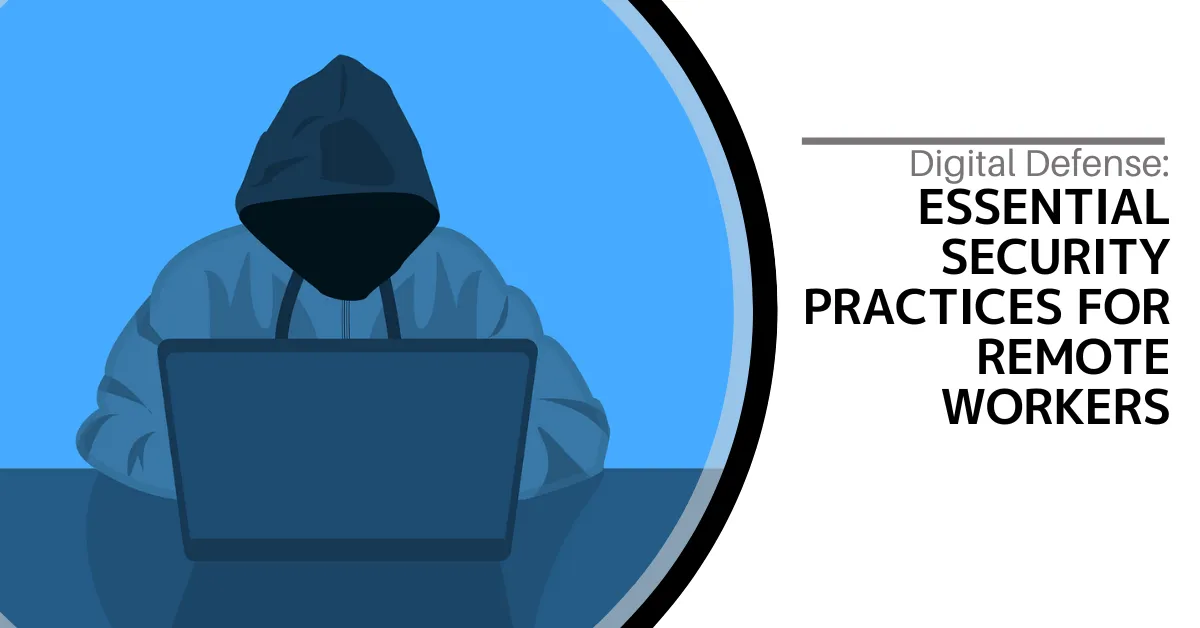See Our Latest Blogs
Stay updated with the latest trends and insights in Information Technology, cybersecurity, and digital transformation. Explore expert advice, practical tips, and innovative solutions to enhance your business efficiency and security on the CMIT Solutions blog

Digital Defense: Essential Security Practices for Remote Workers
The Rise of Remote Work: Essential Cybersecurity Practices
Remote work is here to stay, but with it comes new cybersecurity challenges. 73% of executives know remote work ups the risk. Here’s how to protect your company’s data and systems from wherever you work.
1. Securing Home Networks
Strong Wi-Fi Encryption
Encrypt your Wi-Fi with WPA3. It’s a basic but crucial step to keep outsiders from hijacking your network and intercepting data .
Changing Default Router Settings
Routers come with default login credentials. Change these to unique, strong passwords to keep cybercriminals out .
2. Use Strong, Unique Passwords
Password Managers
You juggle many accounts. Use a password manager to generate, store, and autofill complex passwords. Every account needs a unique, strong password .
Multi-Factor Authentication (MFA)
MFA adds a critical security layer. Even if a password is stolen, MFA requires a second verification method like a text code or app prompt. This makes unauthorized access much tougher .
3. Protecting Devices
Antivirus/Anti-Malware Software
Install and update antivirus software on all work devices. These tools can catch and neutralize threats before they do damage .
Regular Software Updates
Outdated software is a hacker’s playground. Turn on automatic updates for your operating system, apps, and security software to patch vulnerabilities .
Encrypted Storage
Store sensitive data in encrypted storage. If your device is lost or stolen, encryption keeps your data safe from unauthorized access .
4. Secure Communication Channels
Virtual Private Networks (VPNs)
A VPN encrypts your internet traffic, shielding it from prying eyes. Use a reputable VPN, especially on public or unsecured networks, to protect your data .
Encrypted Messaging and Email
Choose messaging and email services with encryption. This keeps your communications private and secure from end to end .
5. Safe Browsing Practices
Browser Security
Keep your browser up-to-date and secure. Enable pop-up blockers, disable third-party cookies, and use HTTPS connections .
Avoiding Phishing Attacks
Be wary of unsolicited emails asking for sensitive info. Verify the sender before clicking links or downloading attachments. Report suspicious emails to IT .
Use of Ad Blockers
Ad blockers prevent malicious ads that may contain malware or phishing links. They add another layer of security while you browse .
6. Education and Training
Regular Security Training
Stay sharp with ongoing security training. This includes phishing simulations and best practices for device and data security. Be aware of new security protocols .
Incident Response Plan
Have a clear incident response plan. Everyone should know the steps to take if there’s a breach, including reporting procedures, mitigation steps, and IT contact info .
7. Personal Responsibility and Vigilance
Personal Device Hygiene
Keep your personal devices secure with regular backups and secure configurations. Separate personal and professional activities when possible .
Being Aware of Social Engineering
Understand social engineering tactics like pretexting and baiting. Stay skeptical to avoid falling victim to these manipulative attacks .
Need Help Improving Remote Work Cybersecurity?
Remote work demands updated digital security practices. Cyber threats evolve, and so must our defenses. Our experts can help secure your remote work environment. Contact us today to strengthen your cybersecurity.
Sources:
"CMIT has given me peace of mind in my business by providing me with ongoing protection, monitoring and an invaluable resource of providing technical help 24/7 if needed. They have assisted me with various technical needs in my business and I appreciate small businesses supporting other small businesses in our community."
Swiss Learning Center
"CMIT sent Leslie out to deal with my computer issue - which she handled so fast I can't remember now what it was! Leslie was patient, informative, and engaged me with confidence and relief. She did not talk down to me as if I didn't have a modicum of sense - electronically - but instead was in a teaching mode. I'm so glad to know I can call CMIT whenever I have a problem and allay my fear!"
Shari
"Every business NEEDS Carmen and Jaime with CMIT Solutions. They have taken my business to the next level and I am so grateful to have them on our team. It's like having our own personal IT department. We are more productive, more professional, and ready to worry about things other than IT. As a construction company - it is not in our wheelhouse to manage this side of the business and as a small business it's not super easy to know who to contact. They are affordable and knowledgeable and can easily take any business to where they envision. They come with my highest recommendation."
Ashley R.
Get In Touch
Email: [email protected]
Address
Office: 4514 Cole Ave # 600, Dallas, TX 75205
Assistance Hours
Mon – Fri 8:00am – 5:00pm
Sat-Sun – CLOSED
Phone Number:
NOT JUST IT. COMPLETELY MANAGED IT.
Complete IT solutions the moment you need them.
© 2025 CMIT Solutions of Dallas - All Rights Reserved,

